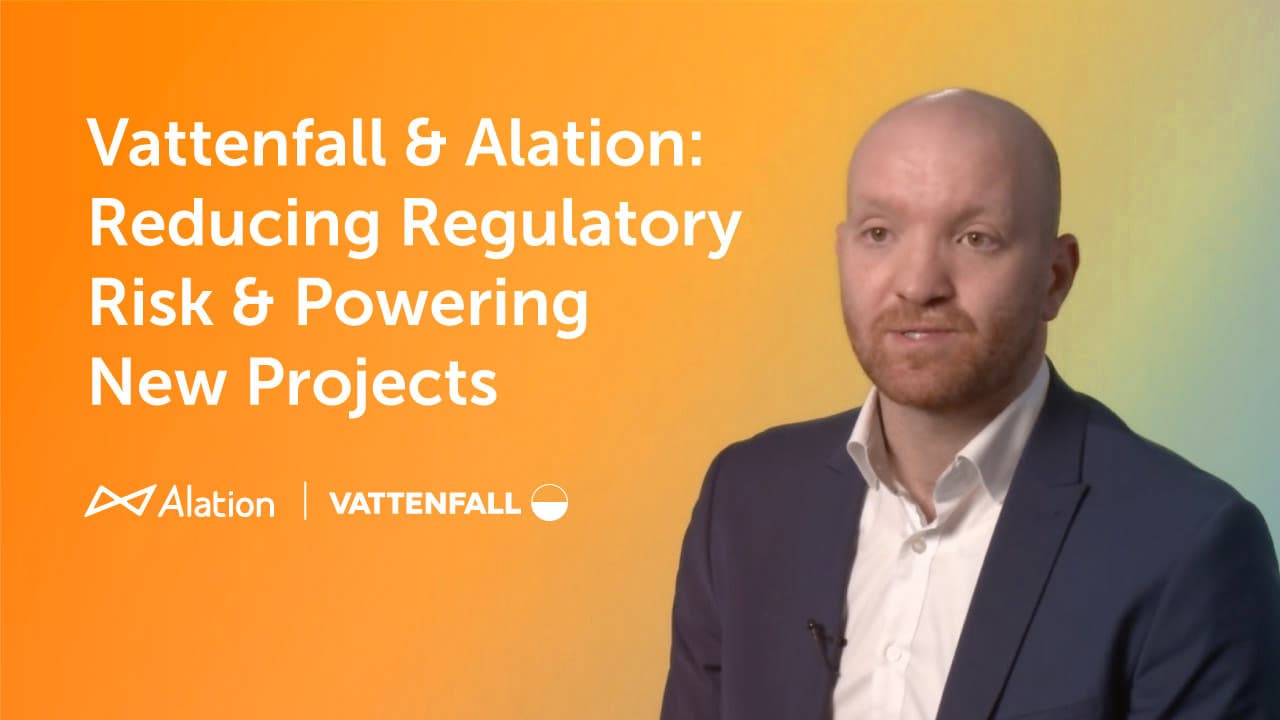
Vattenfall Reduces Regulatory Risk and Powers New Projects with Alation and DQC

"After implementing Alation, we see more collaboration, and we see more discussions. For the enterprise, Alation is the single source of truth."
Business Results
81%
faster project development, from 3 months to 3 weeks
10X
faster creation of data quality rules
1000+
data objects improved in core systems monthly
Business Need: Harness the power of siloed data
Vattenfall is one of Europe’s largest and most forward-thinking power generation and distribution companies. Their vision is to provide “fossil-free living within one generation.” Fossil-free living primarily focuses on decarbonizing electricity production, but Vattenfall has developed an innovative process to power steel production with hydrogen instead of coal.
To achieve its vision of fossil-free living within one generation, Vattenfall is becoming a data-driven company. “We identified user-centricity and high-quality data as key enablers to foster our data culture and generate business value. This requires flexibility and common standards at the same time,” explains Sebastian Kaus, Vattenfall's Data Governance Lead.
High-quality data is also critical to ensuring compliance with regulations, including the GDPR, in multiple countries and the EU, which imposes massive fines for the unauthorized use of personal data. Failure to comply with national energy and operational reporting requirements can also result in fines in the millions of euros.
Vattenfall’s data landscape had grown increasingly complex over the years. Although operating across borders and energy sectors required data sharing and collaboration, data was locked in silos, and knowledge about the data was locked in the heads of individual SMEs. Leaders at Vattenfall realized they were missing deeper data insights and risking regulatory fines because people could not easily find trusted data for their reporting needs.
Objectives:
Before they could fully harness the power of their data, Vattenfall first needed to:
Create a single repository for trusted, high-quality data
Actively govern data to protect it from misuse
Establish an enterprise-wide data culture
Solution: A single source of truth for high-quality data
Vattenfall chose Alation as their data intelligence platform for data search and discovery, collaboration, and data governance and the DQC automated data quality management tool. “Data governance and data quality are akin to traffic regulations,” says Kaus. “Few people get excited about them, but they help everyone get from point A to point B safely.” Similarly, data governance and data quality can only be effective if they become the de facto standard and work seamlessly together, with as much automation as possible. “It’s great that Alation and DQC integrate well and complement each other perfectly to make high-quality data available,” says Kaus.
To create a one-stop shop for data, Vattenfall curated the metadata from several business units and approximately 70 data sources—including SAP, Snowflake, and Databricks. A business glossary helps define standard terminology to ensure that all users have a common understanding of critical business terms. SMEs can now share their expertise through articles in the catalog, speeding up the transfer of knowledge throughout the company.
“Before Alation, we saw a lot of silos and individual documentation — and the risks and inefficiencies associated with that,” says Kaus. “After implementing Alation, we see more collaboration, and we see more discussions. For the enterprise, Alation is the single source of truth.”
The integration of Alation and DQC in the data landscape allows users to view business data quality in the context of the data catalog, not only to identify issues but also to improve data at the source in an integrated and partially automated process. Intuitive, non-technical interfaces and automation help drive adoption.
Figure: Seamless Integration of Alation and DQC
Results: High-quality, governed data improves productivity and reduces risk
Today approximately 500 people each month achieve faster data insights at Vattenfall because they can easily find, understand, and collaborate around the trusted data they find in Alation. Kaus notes that developers can launch new projects within weeks instead of months. “With Alation, we see a great increase in efficiency,” he says. “We have clarity on our most important sources, especially the critical ones.”
According to Kaus, “The smart solutions from DQC and Alation serve as a broker between data sources and subject matter experts, automatically distributing data management tasks to the right person in the business.” For example, by automating much of the rule-generation process, Vattenfall can create business-relevant data quality rules ten times faster than previously. “The introduction of GenAI for data quality rule generation dramatically reduces the time and labor needed for data quality checks, proving that innovative technology can significantly enhance efficiency,” says Kaus. Furthermore, with DQC’s integration into familiar tools such as MS Teams and Excel, Vattenfall can correct 1,000+ data objects in core systems each month.
Vattenfall uses Alation’s data governance features to better manage risk. By surfacing policies and privacy tags in Alation, Vattenfall prevents misuse of customers’ personal information and avoids millions of euros in GDPR fines. “The GDPR requires us to know where our data sits and how it should be processed,” notes Kaus. “Because we store that information in Alation, it becomes much easier for us to be compliant.” Alation also helps Vattenfall meet regulatory requirements that call for quality data.
Insight, collaboration, innovation. That’s what a strong data culture now enables at Vattenfall. “All data is knowledge, and knowledge is power,” concludes Kaus. “It’s important to us to provide access to and knowledge about data so people can make informed decisions. Alation and DQC provide exactly that.”